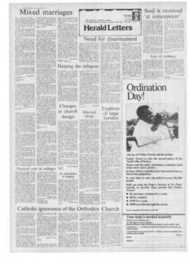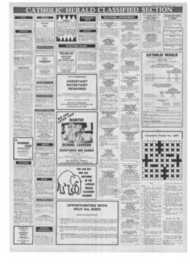Page 2, 20th July 1979
Page 2

Report an error
Noticed an error on this page?If you've noticed an error in this article please click here to report it.
Tags
Share
Related articles
Pro-lifers Hail Bortion Bill
Mps Prepare For Abortion Showdown
Pro-life Peers Fail To Derail Embryology Bill
Steel Warns Sld On Abortion Policy
Fears Grow Over Abortion Proposal
Watering down of the Abortion Bill feared
Harry Parkinson examines the abortion debate. The pro-life organisations, the Society for the Protection of Unborn Children and Life, Fear that Mr John Corric's Bill to amend the abortion law, which on a second reading in the Commons last Friday. may he watered down in the committee stage before the crucial third reading.
The degree to which Mr Corrie may he willing to compromise on the main clauses of the Bill in committee is giving hope to the supporters or the present Act and worrying the pro-life reformers. Both SPUC and Life said this week that they fear the Bill may be watered down to such an este it that even If it became law it would make very little difference to the present state of affairs. Pro-lifers have had to stand up to. and answer, criticism from supporters or the present Act. The National Abortion Campaign, the most extreme proabortion group, have us their goal free abortion on demand up to birth. They are a left-wing group which has achieved some success with the trade unions. students and feminists.
:A group called Christians for Free Choice are among the supporters of the present Act. one of their aims being greater equality in the abortion facilities nvailable to women, They believe that the welfare of the "established" life of u woman and existing children take precedence over the "potential" tile iii the womb, They do not believe that the decision to abort should be taken lightly or irresponsibly but should he governed by "the law of love and compassion". They think, however, that there is a good case for u 24-week legal limit.
A few days before the second reading of the Bill last week Cardinal Hume sent a letter of thanks, encouragement and support to Mr John Carrie. In the letter the Cardinal states the Church's position on abortion: "The Church is committed unconditionally to the defence of human life, however dependent, however handicapped. It is, quite simply, against abortion."
The statement by the Cardinal could also be said to define the position of the pro-life organisations.
The Society for the Protection of Unborn Children was formed In January 1967, to rally opposition to the David Steel Abortion Bill, then being debated by Parliament, Life was founded in August 1970, to oppose abortion uctively and positively by educating people about the true nature of abortion, resisting tll legislation which discriminutes against the unborn and to help women avoid abortion.
Both organisations, like the Church are "quite simply against abortion" and would welcome any positive attempt to limit the loss or innocent life.
Most pro-abortionists are reluctant to admit that abortion destroys human life, preferring to term the developing baby in the womb "foetal tissue" or "potential life" arid to speculute about the moment that the foetus/baby becomes eligible for the title of human being. This is often said to he at "viability" or birth itself, Germain Ciriset writes in his book, Abortion, the Myths, the Realities and the Arguments: The proper demarcation between parents and offspring is con ception — the creation of an individual from two different sources"; and Bernard Towers wrote in "The Month" in July 1967: "At conception each one of us inherited not only characteristics from our parents hut also many that are quite Individual, such as the precise colour of our eyes and skin, our finger-prints and the shape of our faces," If the pro-abortionists could recognise' thut life begins at con ception and that therefore conse quently all abortion destroys human beings the debate could move On to consider if there are ever grounds upon which abortion can be justified by the "law of love and compassion" or decided upon as the lesser of two evils,
One or Life's main objectives is to educate people about the true nature or abortion. Many people
are certainly unaware what an abortion involves— the operation itself and often the consequent effect upon the mental and physical health of the mother.
A leading gynaecologist at Mr Corrie's press conference last week said that if members of' the public were to take part in abortions they would soon become repulsed by the horror of killing babies in the womb. If the Bill becomes law, in helping women prastically to avoid abortion, Life will, of course, have more work to do. A recent government grant has enabled the orgunisation to employ a housing officer, It has hoped that other offers of assistance will follow.
In his letter Cardinal Fiume fires and inspires Catholics and the pro-life movement and outlines the way forward with the
ds "A compassionate society does not try to solve human problems by wholesale destruction but by building an environment in which each individual is made welcome and helped to lead a full and worthwhile life."
• An open verdict has been returned in the inquest on a foetus which survived for 36 hours after an abortion in a hospital in Barnsley, South Yorkshire. The inquest at Sheffield was told that the mother had been advised to have an abortion because of German measles contracted during pregnancy,
blog comments powered by Disqus











